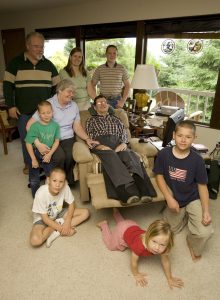G.K. Chesterton, a writer with the rare gift of distilling enormous truths into one startling sentence, once said, “The most extraordinary thing in the world is an ordinary man, his ordinary wife, and their ordinary children.”
He would have uttered this some time ago, as the great Catholic philosopher died in 1936, but his words have only become more true and more startling in the intervening years.
The naturally occurring family, born of the near-irresistible longing of a man and a woman for each other and the pretty way their union fills their laps with children, is in danger of becoming an anachronism. It is hard to think of a greater mistake that we could make as human beings than that of discarding the wildly romantic ideal of the family.
It is romantic because it requires the abandonment of the cramped and narrow dimensions of the self and a leap into the adventure of living wholeheartedly for the “other.” It is a mistake to discard it because that is where human flourishing — the deep and lasting kind — is to be found. And also where the indispensable, homely virtues of forbearance and forgiveness are taught and learned.
This past year my two oldest children have gotten married, even though they are young by modern standards. Watching the two couples making wildly daring promises of fidelity to each other at the altar was deeply gratifying to my husband and I.
Although we are sure we have made innumerable mistakes in their raising, their relatively early marriages are a sign that we’ve been able to teach them confidence: in their own ability to persevere in love, and in the ability of their beloved to do the same.
Ordinary men and women that they are, they are embarking on an extraordinary adventure. Much more than a living arrangement based on their mutual attraction, each couple is starting a family, basic cell of society, backbone of the culture, soft and welcoming nest for the next, fledgling generation.
Already they have made an impact on the world around them. That trip to the altar and back, the solemnity of their vows before God and their family and friends, has impressed their friends. The ones in serious relationships are saying to themselves: “Why not? We can also be daring in our love. It is terribly romantic to promise each other everything.”
How natural and beautiful it is when the fruits of love — children — come to grace a marriage. What could be better? Children born into the embrace of a man and woman who have given themselves to each other entirely are at a great advantage, not because their lives will be free of material difficulties or negative experiences, but because they will begin and end each day in the safe and strengthening clasp of the family.
Beset as the members of all families may be with all the myriad defects that are inherent in fallen human nature, the solidity of their bonds make the family the best soil for growing robust children. Like young healthy trees with deep roots, they withstand the storms of life that blow others away.

On the other end of life is just such another need for strong and lasting bonds. I’ve been very aware of this lately, as my father is being nailed to the cross of amyotrophic lateral sclerosis (ALS), a slowly paralyzing neurodegenerative disorder.
What his life would be, and my mother’s, without their children, their daughters- and sons-in-law, their many grandchildren surrounding them with assistance and tenderness I can’t begin to imagine.
And as his condition worsens, his gratitude and my mother’s gratitude for the gift of family grows. The old satisfaction of personal accomplishment and personal success is being dissolved into the sweetness of letting those who love them care for them tenderly. They understand perfectly now the high promise of that ancient biblical blessing: May you live to see your children’s children.
It all is, as Chesterton put it, so ordinary and at the same time the most extraordinary thing. Family: a great gift from a loving creator who made his creatures sigh for one another and turned those sighs into indispensable blessings, generation upon generation, from the beginning until the end of time, if we are so fortunate as to value the gift.

